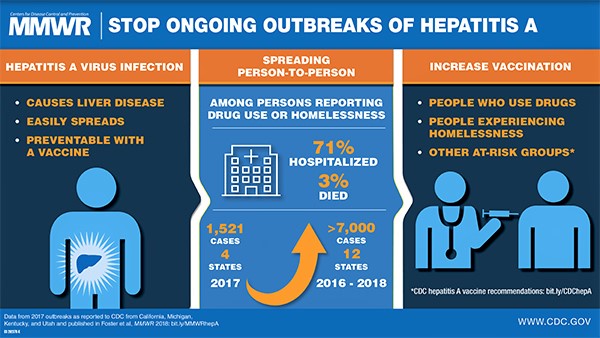
Marion, Sumter and Lake counties are among 17 in Florida that have been critically impacted by a hepatitis A outbreak.
That wide-ranging impact across the Sunshine State has led Florida Surgeon General Dr. Scott Rivkees to declare a public health emergency to address the increase in cases due to the current national outbreak.
The declaration builds upon the public health advisory that was issued by the Florida Department of Health (FDOH) in November 2018.
“The best way to prevent hepatitis A is through vaccination,” Rivkees said. “It is important that we vaccinate as many high-risk individuals as possible in order to achieve herd immunity.”
Pursuant to the public health emergency, the FDOH is requesting assistance from the Centers for Disease Control and Prevention (CDC).
Rivkees’ declaration comes two months after an announcement that a food service worker at a Zaxby’s restaurant in Ocala was identified as having hepatitis A and the parent company of the eatery released a statement.
The declaration serves as a signal to healthcare providers the importance of screening and vaccination for all individuals considered at high risk for contracting hepatitis A. While anyone can contract the infection, those who are considered by the CDC and FDOH to be high risk include:
- The homelessness;
- Intravenous and non-intravenous drug users;
- Men who have sex with other men;
- People in an emergency room or other acute-care setting, after being administered an opioid antagonist such as Naloxone;
- Those working with homeless persons or intravenous drug users outside of health care settings; and
- First responders.
The declaration also recommends vaccination for people who are at heightened risk for suffering serious complications from contracting hepatitis A. This includes people with chronic liver disease, clotting factor disorders and people over 60 years of age with a serious underlying medical condition, as determined by their healthcare provider, in critically impacted counties.

In addition to the tri-county area, the 14 other critically impacted Florida counties are Brevard, Citrus, Glades, Hernando, Hillsborough, Liberty, Manatee, Martin, Okeechobee, Orange, Pasco, Pinellas, Taylor and Volusia. Hepatitis A case counts for 2019 thus far already have surpassed those in 2018. From Jan. 1 through July 27, 2,034 hepatitis A cases were reported.
The state surgeon general also is reminding everyone to practice good handwashing procedures to prevent further spread of hepatitis A. Everyone should wash their hands with soap and water for at least 20 seconds – especially after using restrooms, changing diapers and before preparing or eating food. Additionally, the declaration emphasized the importance of consistent sanitation practices for public and private facilities with restrooms and showers.
Hepatitis A is a highly contagious disease that attacks the liver. People infected with hepatitis A are most contagious from two weeks before onset of symptoms to one week afterwards. Not everyone who is infected will have all of the symptoms.
Those usually start within 28 days of exposure to the virus with a range of 15-50 days. Symptoms can include jaundice (yellowing skin and whites of eyes); fever; diarrhea, fatigue/tired, loss of appetite, nausea and vomiting, stomach pain, dark-colored urine and pale or clay-colored stool.
Visit FloridaHealth.gov/heap to learn more about hepatitis A. On this page, visitors will find general information, frequently asked questions and surveillance data from FDOH, as well as fact sheets for the general public, healthcare providers and food service workers.
For questions about hepatitis A, the FDOH also has established a dedicated email address, HepA@flhealth.gov, and information line, 1-844-225-5364, available Monday–Friday from 8 a.m.–5 p.m.

